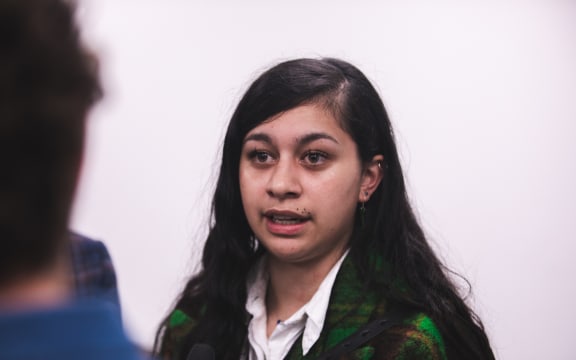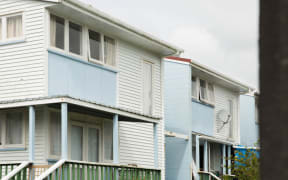Wellington City Council is poised to move its entire social housing portfolio into a new community housing charity.

Mayor Andy Foster has met with the housing minister to seek a change of heart on the payment of its rent subsidy to council tenants. Photo: RNZ /Dom Thomas
The council may also use millions of dollars as part of the government's three waters sweetener fund to subsidise the rents of its low-income tenants.
It is making the changes because it has failed to convince the government to extend its rental subsidy to the council's tenants - something mayor Andy Foster and other councillors have called discriminatory and inequitable.
There are 3000 people in nearly 2000 Wellington City Council-subsidised homes, and most are spending 30 to 60 percent of their income on rent.
Tenant Rosey Ngakopu has neighbours in government-funded social housing who pay just 25 percent.
"It's a huge gap ... why are they better than us? How come they have accessibility to this stuff and we don't, yet we go in the same waka as them," Ngakopu said.
The council subsidised rents to 70 percent of the market rate, but it loses $30,000 each day because of the unsustainable model.
So it will vest its housing stock in a new, independent charity that will be eligible for government support.
The change has been backed by a mayoral taskforce report published yesterday, but Ngakopu said many tenants were worried about the change.
"We live among a lot of vulnerable tenants who aren't skilled, aren't educated, have a lot of health disabilities and things like that and it's about making sure they get taken care of once we go into the change," she said.
One reason the council was handing over its portfolio was so its tenants could get the government's income-related rent subsidy, or the IRRS.
The subsidy ensures people pay no more than 25 percent of their income on rent and the rest is topped up by the government.
Council housing tenants are not eligible for the subsidy, but even after the housing provider takes over the same tenants will remain locked out.
Only the provider's new tenants will be able to get IRRS support.
Foster said it became apparent in talks earlier this year with the minister for housing that the government did not plan to change its criteria for the subsidy to capture those tenants.
He said it was not on.
"You've got to be fair. These are people who are in the same circumstances. The fact that some of them have happened to become a tenant a year ago, compared to someone who becomes a tenant in a year's time. They're in the same circumstance, why are they treated differently?" Foster said.
But those tenants who fall through the cracks may still get financial help, in a roundabout way from the government.
Today council will consider using $6.5 million from the government's three waters sweetener package to establish a tenant support fund for existing tenants under the new model.
Foster said it would be an appropriate use of the money.
"It's about wellbeing for some of our vulnerable tenants who are essentially discriminated against because they're not eligible for IRRS."
He said the proposed new housing model will ensure the council doesn't do to housing what it has done with pipes - look the other way.
Report focuses on tenant wellbeing

Tamatha Paul Photo: RNZ / Samuel Rillstone
The mayoral taskforce group, made up of tenants, community leaders and councillors, released its report for the future of social housing yesterday.
It included a string of recommendations for the new housing provider model that's tenant wellbeing focused.
Councillor Tamatha Paul said the community and councillors haven't given up on lobbying for the subsidy.
"It's just completely arbitrary; there is no real reason as to why our tenants are being disadvantaged," she said.
Councillor Paul said the report was an important "seed" for the future.
"I think it's the beginning of a conversation and a bigger piece of work around social housing, because at the end of the day there is no solving the housing crisis if you don't have social housing."








